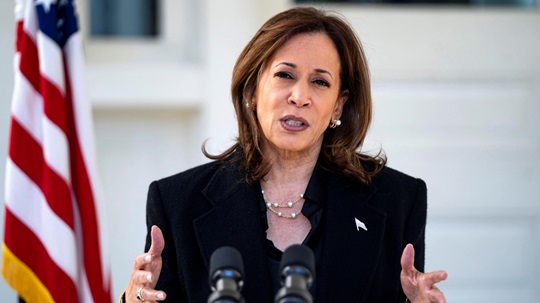On Wednesday afternoon, Kamala Harris stood in front of the vice-presidential residence in Washington DC, and delivered a short but withering attack on her Republican presidential opponent.
Calling Donald Trump “increasingly unhinged and unstable,” she cited critical comments made by John Kelly, Trump’s former White House Chief of Staff, in a New York Times interview.
The vice-president quoted Kelly describing Trump as someone who “certainly falls into the general definition of fascists” and who had spoken approvingly of Hitler several times.
She said her rival wanted “unchecked power” and later, during a CNN Town Hall, was asked point-blank if she believed he was a "fascist". "Yes, I do," she replied.
The Trump campaign quickly accused the Democratic candidate of peddling lies. She is increasingly desperate, spokesman Steven Cheung said, because “she is flailing, and her campaign is in shambles.”
In the home stretch of political campaigns – particularly one as tight and hard-fought as the 2024 presidential race – there is a natural tendency for candidates to turn negative. Attacks tend to be more effective in motivating supporters to head to the polls and disrupting the opposing campaigns.
For Harris, however, the heavier hand toward Trump stands in contrast to the more optimistic, “joyful” messaging of the early days of her campaign.
While she did warn at the Democratic convention of a Trump presidency without the guardrails, Harris largely stepped back from President Joe Biden’s core campaign message that Trump posed an existential threat to American democracy.
According to political strategist Matt Bennett of the centrist Democratic group Third Way, however, it is clear why Harris was quick this time to amplify Kelly’s dark portrait of Trump as a man with authoritarian tendencies.
“Everything she does now is tactical,” he said. “The imperative was to make sure as many voters as possible know about what Kelly said.”
The vice-president’s latest remarks come on the heels of a multi-week strategy by her campaign to appeal to independent voters and moderate Republicans who could be open to supporting the Democratic ticket. Polls suggest the race is extremely tight, with neither candidate having a decisive lead in any of the battleground states.
The suburbs around the biggest cities in key battleground states – Philadelphia, Detroit, Milwaukee and Phoenix, for instance – are populated by college-educated professionals who have traditionally voted for Republicans but who polls indicate have doubts about returning Trump to the White House.
“Her case for how she wins this thing is to create as broad a coalition as possible and bring over disaffected Republicans - people who just don't feel that they can vote for Trump again,” Mr Bennett said.
Devynn DeVelasco, a 20-year-old independent from Nebraska, is one of those who had already been convinced by the long list of senior Republicans who worked for then-President Trump but now say he is unfit for office.
Although she hopes some Republicans will join her in supporting Harris, she worries there is fatigue around the claims made about the former president.
"When these reports [about Kelly’s comments] came out I wasn't shocked, it didn't change much," Ms DeVelasco told the BBC.
Republican strategist Denise Grace Gitsham said voters have been hearing similar rhetoric about Trump since 2016 so any new allegations were unlikely to move the dial.
“If you're voting against Donald Trump because you don't like his personality, you're already a decided voter,” she told the BBC. “But if you're somebody who's looking at the policies and that matters more to you than a vibe or a personality, then you're going to go with the person who you felt you did best under while they were in the White House.”
Both Harris and Trump have been sharpening their barbs in recent days. During a swing through Midwest battleground states on Monday, Harris repeatedly warned of the consequences of a Trump presidency – on abortion rights, on healthcare, on the economy and on US foreign policy.
BBC





